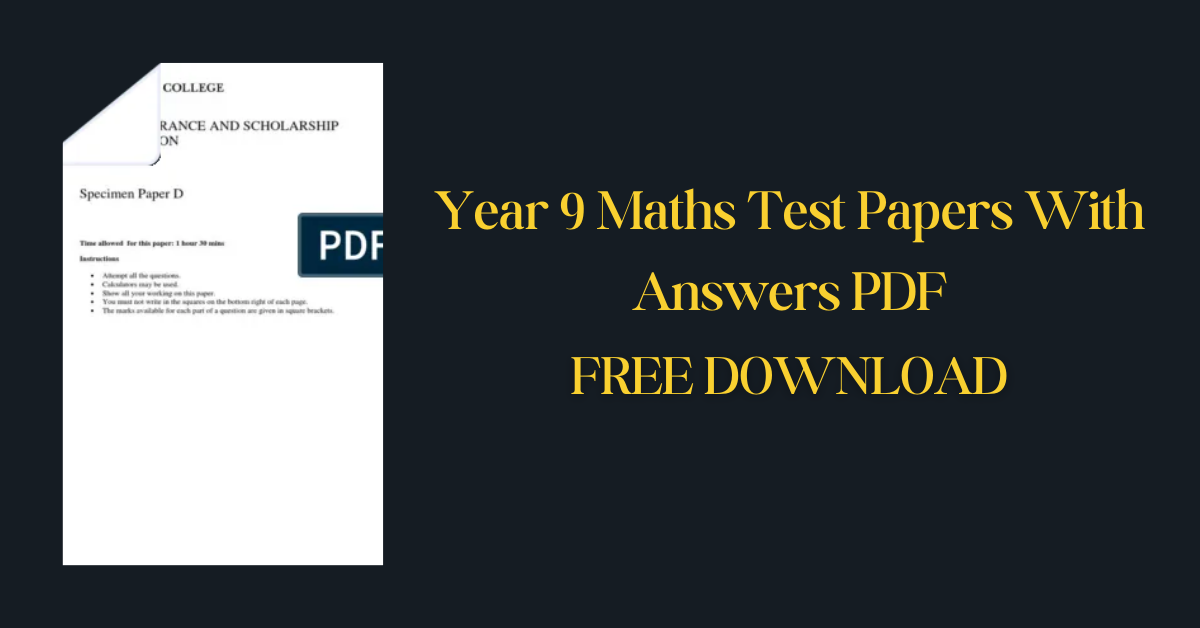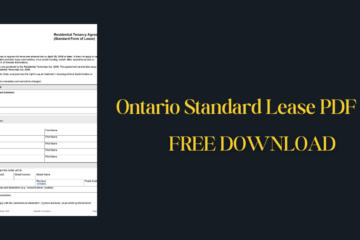The Year 9 maths test in the UK is designed to assess students’ skills and knowledge in various maths topics covered in the Key Stage 3 (KS3) curriculum. The test includes questions on number, algebra, ratio and proportion, geometry, statistics, probability, and other related topics.
Some new topics that may be introduced in Year 9 include standard form, significant figures, direct and inverse proportion, quadratics, Pythagorean theorem, trigonometry, combined events probability, and averages from a frequency table.
The test is suitable for the majority of Year 9 students and includes both procedural questions and applied problems. It is recommended to use the test at the end of Year 9 to assess students’ understanding before they transition to Key Stage 4 and GCSEs.
| Name of the PDF | year 9 maths test papers with answers pdf |
| No. of pages | 18 |
| Category | |
| Language | English |
| PDF Link | Click Here |
Also Download
Charge Of The Light Brigade PDF
Theory Test Questions And Answers PDF
About Year 9 Maths Test
For Year 9 students in the UK, there are specifically designed maths tests that cover the breadth of the Key Stage 3 curriculum, ensuring students are well-prepared for their transition to GCSE-level study.
They are designed to assess students’ skills and knowledge at the end of Year 9, incorporating both procedural questions and applied problems to provide a comprehensive evaluation of students’ mathematical understanding.
The tests typically feature questions of increasing difficulty, starting with those accessible to the majority of Year 9 students and gradually introducing more challenging problems.
This approach is aimed at gauging the depth of students’ mathematical comprehension and their ability to apply knowledge to various scenarios.
KS3 Maths SATs papers, which are also part of the Year 9 assessment, are categorised by ability levels, with Level 3-5 papers aimed at the most basic level and Level 6-8 for the most advanced.
These SATs papers encompass all Key Stage 3 topics, offering a detailed measure of students’ readiness for more advanced studies. Additionally, KS3 Mental Maths Papers are available for download, providing a valuable resource for practising mental arithmetic and problem-solving under timed conditions.
What Topics Are Covered in the Year 9 Maths Test
The Year 9 Maths test in the UK covers a wide range of topics to ensure a comprehensive assessment of students’ understanding and skills as they conclude Key Stage 3 and prepare for GCSEs.
These topics span various areas of the maths curriculum, including both foundational concepts and more advanced material introduced in Year 9. Key topics covered typically include:
- Number: This includes prime numbers, mixed numbers, fractions of amounts, indices, and standard form. Skills in multiplying decimals are also assessed, alongside basic mental and written methods for calculating with integers, fractions, decimals, and percentages.
- Algebra: Topics might include writing expressions, linear equations, substituting into formulae, factorizing single brackets, writing and solving inequalities, and sequences.
- Ratio and Proportion: This area can include questions on ratio, exchange rates, distance-time graphs, and percentage change.
- Geometry: Topics covered may encompass the volume of a prism, angles in parallel lines, enlargement, area of a trapezium, midpoint of coordinates, and the length of a line.
- Statistics and Probability: This could include scatter graphs, means from tables, and tree diagrams. The test assesses students’ ability to collect and interpret data, as well as understand and apply concepts of chance and probability.
New topics introduced in Year 9 might include standard form, significant figures, direct and inverse proportion, quadratics, Pythagoras’ theorem, trigonometry, combined events probability, and averages from a frequency table.
These topics build on the foundation laid in earlier years and prepare students for the more complex mathematical challenges they will face at GCSE level.
The Year 9 Maths test is designed to challenge students across a broad spectrum of topics, with questions ranging from procedural tasks to applied problems that require deeper understanding and problem-solving skills. This ensures that students are well-prepared not only for their end-of-year assessments but also for their future studies in mathematics.
Format and Structure of the Year 9 Maths Test in the UK
The format and structure of the Year 9 Maths test in the UK are designed to comprehensively assess students’ understanding and application of mathematical concepts taught during Key Stage 3 (KS3). These tests include a variety of topics, covering both procedural knowledge and problem-solving skills.
Number of Questions: The test typically includes 18 questions of increasing difficulty to cater to a wide range of abilities among Year 9 students. The questions are designed to start at a level accessible to most students and gradually increase in complexity, with some higher-level questions towards the end.
Types of Questions: The test contains a mix of procedural questions, reasoning questions, multi-step applied questions, and ‘show that’ questions. This variety is similar to the mix found in a GCSE maths exam paper, preparing students for the types of questions they will encounter in future exams.
Marks: The total number of marks available for the test is 50, with each question worth between 1 and 3 marks.
Duration: The test is designed to be completed within one hour, making it suitable for a single lesson period.
Calculator Use: Students are allowed to use calculators, which reflects the nature of some of the questions that require computational accuracy.
How to Prepare for the Year 9 Maths Test
To effectively prepare for the Year 9 Maths test in the UK, consider the following strategies and resources:
Review Key Topics: Start by focusing on both the foundational topics covered in previous years and the new topics introduced in Year 9. This includes areas such as number, algebra, ratio and proportion, geometry, statistics, and probability. New topics may include standard form, significant figures, direct and inverse proportion, quadratics, Pythagoras’ theorem, trigonometry, combined events probability, and averages from a frequency table.
Practise a Variety of Questions: Engage with a range of question types that mirror those found in the test, including procedural, reasoning, multi-step applied questions, and ‘show that’ questions. This will help build familiarity with the format and improve problem-solving skills.
Use Online Resources and Worksheets: Platforms like EdPlace offer a wealth of Year 9 Maths worksheets across various topics such as algebra, shapes, sequences, and angles. These resources are mapped to the curriculum and can provide both practice and revision material.
Develop Mathematical Thinking: Encourage activities that promote mathematical reasoning, problem-solving, and real-world application. These skills are crucial not only for succeeding in tests but also for understanding the practical use of maths.
Build a Solid Study Routine: Regular, focused study sessions away from distractions can enhance understanding and retention. Completing homework, using recommended books or websites for additional practice, and seeking help when needed are all part of a good study routine.
Engage with Learning Resources: Familiarise yourself with the resources recommended by your child’s school and explore additional materials online. Working through problems together or discussing concepts can reinforce learning.
Benefits of Year 9 Maths Test Papers With Answers
Using Year 9 Maths test papers with answers provides several benefits for students, educators, and parents alike. These include:
Comprehensive Assessment: Year 9 Maths test papers cover a broad range of topics from the KS3 curriculum, including numbers, algebra, ratio and proportion, geometry, statistics, and probability. They incorporate both procedural questions and applied problems, allowing for a thorough assessment of a student’s mathematical skills and knowledge.
Preparation for Future Studies: The tests introduce new topics that are crucial for GCSE preparation, such as standard form, significant figures, and Pythagoras’ theorem, among others. This early exposure helps students to start building the foundation they will need for their GCSE years.
Skill Development: The tests are designed to develop students’ skills in ‘working mathematically,’ including fluency in the number system, algebra, and mathematical terminology. They also focus on enhancing mathematical reasoning, allowing students to make connections between different areas of mathematics and develop problem-solving skills. These are essential competencies not just for exams but for real-life mathematical applications.
Immediate Feedback: Having access to answers and a mark scheme enables students to receive immediate feedback on their performance. This helps in identifying areas of strength and weakness, allowing for targeted revision and improvement.
Enhanced Learning Resources: The availability of test papers with answers is often accompanied by revision guides, worksheets, and additional support materials. These resources can help students to further understand and practise new concepts introduced in Year 9, reinforcing their learning and preparation for subsequent studies.
Boosted Confidence: Practising with test papers and having the answers allows students to check their work and understand their mistakes. This process can significantly boost their confidence in their mathematical abilities as they see improvement over time.
Supports Independent Learning: Test papers with answers encourage students to take charge of their learning. They can work through problems at their own pace, review their answers, and use the mark scheme to understand where they went wrong, promoting a more self-directed approach to learning.
Where to Find Year 9 Maths Test Papers With Answers
For Year 9 Maths test papers with answers, you have several options available online that can provide a comprehensive range of materials suitable for revision and practice:
Third Space Learning
Offers free Year 9 Maths tests with answers and mark schemes. Their resources include both procedural questions and applied problems, covering critical topics from the KS3 curriculum.
This platform is particularly beneficial as it provides tests designed for end-of-year assessment, catering to a broad range of mathematical skills across number, algebra, ratio and proportion, geometry, statistics, and probability.
You can download a free end-of-Year 9 maths test with 18 practice questions, answers, and mark schemes directly from their site.
EdPlace
Provides a wide selection of Year 9 Maths worksheets and tests, which are mapped to the Curriculum. This resource offers an activity-based learning approach, with worksheets available on topics like algebra, geometry, and statistics, among others.
EdPlace’s materials are designed to help students practise and reinforce their knowledge, with free trials available to assess the quality of their content.
Tips to Effectively Use Year 9 Maths Test Papers With Answers
Using Year 9 Maths test papers with answers can be a highly effective study tool if approached correctly. Here are some tips to maximise their benefits:
Understand the Format: Before starting, familiarise yourself with the structure and types of questions that appear in the test papers. This helps you understand what to expect and how to approach different sections.
Set a Timed Environment: Simulate exam conditions by timing yourself while taking the test. This practice helps improve time management skills and prepares you for the pressure of the actual exam environment.
Review Answers Thoroughly: After completing a test, use the answer key to check your work. Pay close attention to the solutions for questions you got wrong or found challenging. Understanding where you made mistakes is crucial for learning and improvement.
Focus on Weak Areas: Identify topics where you constantly struggle and allocate more study time to these areas. Use the comprehensive revision guides and worksheets provided by resources like Third Space Learning to strengthen these weak points.
Practice Regularly: Consistent practice is key to mastering mathematical concepts. Regularly working through test papers helps reinforce learning and improves recall and problem-solving skills over time.
Seek Feedback: Discuss your answers and any mistakes you made with a teacher or tutor. External feedback provides new perspectives and can help clarify misunderstandings or introduce more efficient solving techniques.
Use Mistakes as Learning Opportunities: Instead of getting discouraged by errors, view them as opportunities to learn. Deep dive into the rationale behind the correct answers to understand the logic and methods used.
Incorporate Real-World Problems: Engage with questions that require applying mathematical concepts to real-world scenarios. This approach not only enhances problem-solving skills but also demonstrates the practical applications of mathematics.
Encourage Group Study: Studying with peers can provide mutual support. Discussing and solving problems together can introduce new strategies and help solidify understanding through teaching others.
Conclusion
Year 9 maths tests play a key role within the wider UK mathematics curriculum. While these assessments can be a source of stress for some students, they are fundamentally a tool for both evaluation and growth. These tests highlight students’ strengths, pinpoint areas for further development, and provide essential preparation for the rigours of GCSE exams.
Beyond immediate exam scores, Year 9 tests foster the development of problem-solving skills, logical reasoning, and analytical thinking – abilities that extend far beyond the classroom.
By understanding the purpose of these tests and approaching them with a focus on continuous learning, students build a strong foundation for success in mathematics and the many fields where these skills are invaluable.
FAQs
What topics are covered in Year 9 maths tests?
Year 9 maths tests build upon the skills learned in previous years and delve deeper into concepts within the following areas: Number (fractions, decimals, percentages, negative numbers), Algebra (expressions, equations, and graphs), Ratio, Proportion, and Rates of Change, Geometry and Measures (shapes, angles, transformations, units of measurement), Probability, and Statistics.
How often do Year 9 students take maths tests?
The frequency of maths tests in Year 9 can vary between schools. Typically, students might have smaller assessments throughout the year to check their progress, alongside more formal end-of-term or end-of-year exams.
What is the format of Year 9 maths tests?
Year 9 maths tests often include a mixture of question types: short answer, multiple-choice, problem-solving questions, and ones requiring more extended written explanations. Some of the tests might have a calculator section and a non-calculator section.
How long are Year 9 maths tests?
The duration of Year 9 maths tests depends on the specific test. Some shorter assessments might last around an hour, whereas more significant exams could be longer.
How are Year 9 maths tests graded?
In the UK, many schools begin aligning their grading with the GCSE system in Year 9. This means students might receive grades from 9 to 1 (9 being the highest). However, some schools may still use their own internal grading systems.
Why are Year 9 maths tests important?
These tests serve several vital purposes: they assess the student’s understanding of mathematical concepts, identify areas where they might need more support, help teachers tailor their teaching, and prepare students for the more rigorous GCSE maths exams in Years 10 and 11.
How can I prepare for Year 9 maths tests?
Effective preparation is key! Practise regularly using past papers, online resources, and textbooks. Focus on understanding the concepts, not just memorising procedures. If you have questions or areas you struggle with, don’t hesitate to ask your teacher for help.
What if I’m struggling with Year 9 maths?
Don’t panic! Talk to your teacher about the areas where you need extra support. They might recommend additional resources, practice problems, or even arrange for some one-on-one tutoring. There are also various online resources and study groups that can be helpful.
Are there any resources to help me with Year 9 maths revision?
Absolutely! Many websites offer practice questions, revision guides, and past papers specifically tailored to Year 9 maths. Some popular ones include BBC Bitesize, Maths Genie, and OnMaths. Your school may also have additional resources available.
What if I experience test anxiety?
Maths anxiety is quite common. Talk to your teacher or school counsellor about strategies to manage anxiety, such as relaxation techniques or practising positive affirmations. Getting enough sleep and eating well before the test can also contribute to a calmer mindset.

Niketa Mulay, a seasoned content writer and editor, has over a decade of experience. With a Master’s in Journalism, she honed her skills at The Times of India and now freelances across various industries. Passionate about reading, writing, and scuba diving, she shares expert PDF guides and tips at PDFdrivehub.com.




